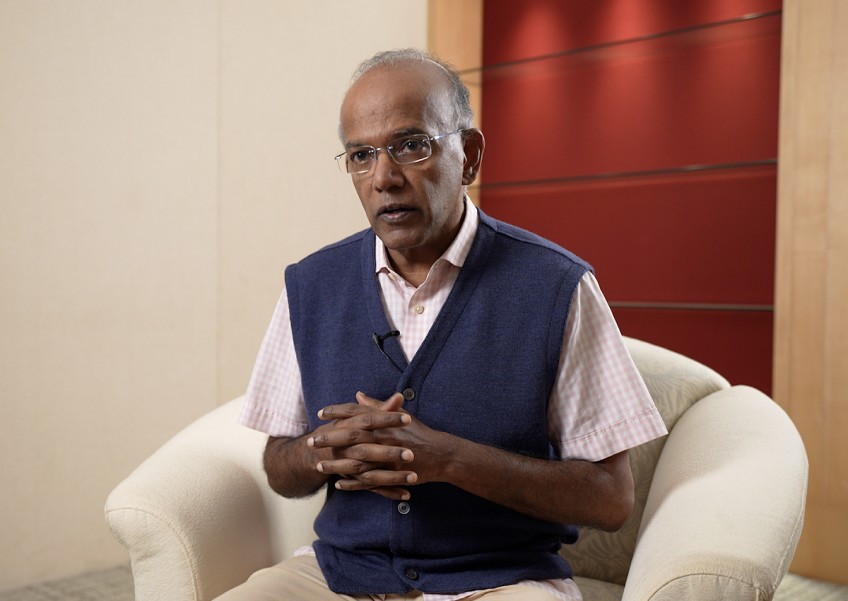风萧萧_Frank
以文会友新加坡内阁部长怒怼英媒《经济学人》:你的嘲笑值几个钱?
熊超然 2024-04-21 来源:观察者网
【文/观察者网 熊超然】随着新加坡总理李显龙即将在5月15日“交棒”副总理兼财政部长黄循财,新加坡政治即将进入新一阶段。
当地时间4月18日,英国《经济学人》周刊发表了一篇评论文章,讨论新加坡的“政治交接”,其中语气不乏嘲笑轻视之意,不仅称黄循财是“陌生面孔”、“非首选接班人”,还对新加坡人民行动党议论纷纷。
4月19日,新加坡内政部长兼律政部长尚穆根在其个人脸书账号发文,从国家治理、经济等诸多方面举例,对比新加坡和英国的两国情况,以反驳《经济学人》。他指出,相比于新加坡政局稳定,英国不仅政局混乱,且政客以权谋私;新加坡过去被英国殖民时人均GDP仅有500美元,如今不但超8万美元,还远远领先于英国。
除此之外,新加坡在社会治理的方方面面都优于英国,为此,尚穆根“灵魂拷问”《经济学人》:“你的嘲笑值几个钱?”

尚穆根脸书截图 Lawrence wong will be only fourth PM
《经济学人》的这篇文章称,新加坡59年以来“只出现”三位领导人,但即将接任总理的黄循财对许多新加坡人来说依旧是“陌生面孔”。文章还称,黄循财其实并非新加坡“第四代团队领导人”的首选,只因另一位副总理王瑞杰2021年“基于年龄和健康的考量”突然退出“总理之争”。
此外,文章还称,未来的大选将是对黄循财的重大考验,尽管如此,人民行动党仍将获胜,《经济学人》将此归因于人民行动党强大的政党组织、对反对党的“无情打压”,以及新加坡当地媒体“太过温顺”所致。
针对这一篇评论文章,新加坡内政部长兼律政部长尚穆根在社交媒体脸书发文反击称,《经济学人》对新加坡“语带嘲笑”,这是根植于英国“评论阶级”潜意识深处的一种本能,他们无法忍受曾经殖民过的国家如今表现得更好。
尚穆根表示,从治理角度而言,黄循财将是新加坡59年来的第四任总理,而苏纳克则是英国4.9年以来的第四任首相。与此同时,英国前首相约翰逊在任职期间,接受了捐赠者提供的价值1.5万英镑的旅行费用,以及5万英镑的住宅装修费用,“在新加坡,任何像约翰逊这样做的人都会受到法庭指控”。
尚穆根表示,从经济角度而言,新加坡最初是英国的殖民地,人均GDP只有500美元,现在已增长到超过8万美元。《福布斯》杂志最近的一份报告则显示,若按购买力平价计算,新加坡的人均GDP在全球排名第五,远远领先于英国。
谈到新加坡媒体被形容为“温顺”,尚穆根写道:“它(《经济学人》)显然更喜欢像英国这样的情况,一个人可以控制主要媒体,让政客们向其献殷勤,媒体所有者可以影响谁当选、谁成为首相。在出现类似情况的澳大利亚,一位前总理将此情况形容为‘民主的毒瘤’。”

资料图:新加坡内政部长兼律政部长尚穆根
紧接着这些,尚穆根又在社会服务、公共安全、法律秩序、社会凝聚力、种族阶级等多个方面论证新加坡优于英国。
比如他提到,去年,整个英格兰和威尔士地区,在对超33万起车辆犯罪(包括盗窃和入室盗窃)的调查结案中(占所有报案量的85%),没有任何嫌疑人被逮捕;在100多个社区中,没有汽车盗窃案被破获。这种情况在新加坡简直“不可想象和不可接受”,自2015年以来,新加坡一直被调查机构盖洛普评为“全球最安全国家”,95%的新加坡成年人认为夜间独自行走是安全的。
最后,尚穆根反问了《经济学人》一句话:“你的嘲笑值几个钱?(What price your sneer?)”
据新加坡《联合早报》此前报道,新加坡总理公署4月15日下午发文告,宣布新加坡总理李显龙将在5月15日正式卸下总理职务。
《联合早报》按照新加坡首两任总理李光耀和吴作栋当年移交职权的时间表推算,李显龙很可能在5月13日,即15日交棒的两天前,向新加坡总统尚达曼递交辞呈,连同整个政府班底一起辞职,并向总统提议由新加坡副总理兼财政部长黄循财接任总理,组建政府。
新加坡总统接受原总理的辞呈后,将委任黄循财为新总理,而新总理也会把新的内阁名单提呈给总统。黄循财将在15日晚上8时在新加坡总统府宣誓就职该国第四任总理。黄循财此前在2022年4月获推举为第四代团队的领袖。
《联合早报》报道称,今年8月的新加坡国庆群众大会,将由新总理向该国全国人民发表演说。新加坡总理公署文告还显示,新加坡人民行动党议员一致支持现年51岁的黄循财接下领导国家的棒子。
<<<<<<<<>>>>>>>>>
“你的冷笑要付出什么代价”:尚穆根回击《经济学人》对新加坡领导层换届的评论
https://www.asiaone.com/singapore/what-price-your-sneer-shanmugam-hits-backs-economist-commentary-singapores-leadership
“你的冷笑要付出什么代价”:尚穆根回击《经济学人》对新加坡领导层换届的评论
2024 年 4 月 20 日 作者:CHING SHI JIE
“《经济学人》无法抗拒嘲笑,”法律和内政部长尚穆根在谈到英国出版物有关新加坡领导层过渡的评论文章时说道。
周四(4月18日)发表的这篇740字的文章称,黄循财将只是新加坡历史上第四位总理,他“在新加坡人中仍然相对不为人所知”。
“他不是 4G 的第一选择,”《经济学人》补充道,同时形容黄是一个“弹着吉他、自认是书呆子”的人,比“大多数执政精英”更容易与新加坡人产生共鸣。
文章还声称,执政的人民行动党将因其“对反对派的不懈攻击”等原因而赢得即将举行的大选。
作为回应,尚穆根周五在脸书上发帖表示,这家英国出版物“无法忍受他们习惯于讲课的人现在做得比他们更好”。
“这是英国评论界潜意识深处的一种本能,”部长补充道。
尚穆根表示,黄副总理将接替李显龙担任总理,成为新加坡 59 年来的第四任总理,而英国的里希·苏纳克 (Rishi Sunak) 则是 4.9 年来的第四任总理。
苏纳克接替了利兹·特拉斯,后者是英国历史上最短的首相——在任仅 49 天。
在经济方面,尚穆根表示,新加坡的人均国内生产总值超过109,000美元,位居世界第五。
“远远领先于英国,”他补充道。
尚穆根表示,新加坡还为人民提供“更好的医疗保健、住房和教育”,无论阶级和种族如何,以及公共安全和社会凝聚力。
他举例说,在英格兰和威尔士,85% 的犯罪案件都已结案,没有任何嫌疑人被抓获,而在 100 多个社区,“所报告的汽车盗窃案件的破案率为零”。
“这样的情况在新加坡是不可想象和不可接受的,”他说。
尚穆根还指出英国一位政治捐助者如何发表种族主义言论,他的政党表示“一切都应该继续前进”。
“在新加坡,发表此类言论的人可能会受到法庭指控,”他说。 “你的冷笑要付出什么代价。”
'What price your sneer': Shanmugam hits back at Economist commentary on Singapore's leadership transition

"The Economist can't resist sneering," said Law and Home Affairs Minister K Shanmugam of the British publication's commentary piece on Singapore's leadership transition.
The 740-word article, published on Thursday (April 18), said that Lawrence Wong will only be the fourth prime minister in Singapore's history and he "remains relatively unknown among Singaporeans".
"He was not the 4G's first choice," The Economist added while describing Wong as a "guitar-strumming, self confessed nerd" who is more relatable to Singaporeans than "most of the governing elites".
The article also claimed that the ruling People's Action Party will win the upcoming General Election due to its "unrelenting attacks on the opposition" among other reasons.
In response, Shanmugam said in a Facebook post on Friday that the British publication "can't stand that people they were accustomed to lecturing are now doing better than they are".
"It's an instinct lodged deep in the unconscious of the British commentariat class," the minister added.
While Deputy Prime Minister Wong will take over as prime minister from Lee Hsien Loong as Singapore's fourth prime minister in 59 years, Britain's Rishi Sunak is the fourth PM in 4.9 years, Shanmugam said.
Sunak had succeeded Liz Truss, who was the shortest prime minister in Britain's history - just 49 days in office.
On the economy, Shanmugam said that Singapore's per capita gross domestic product at over $109,000 is the fifth highest in the world.
"Well ahead of the UK," he added.
Shanmugam said that Singapore also provides "far better healthcare, housing and education" to its people, regardless of classes and races, as well as public safety and social cohesion.
He cited how 85 per cent of all crime cases reported in England and Wales were closed without any suspect caught, and "0 per cent of reported car thefts are solved" in more than a hundred neighbourhoods.
"A situation like that would be unthinkable and unacceptable in Singapore," he said.
Shanmugam also pointed out how a political donor in Britain made racist remarks, and his party said that "all should just move on".
"In Singapore, a person who makes such a comment is likely to be charged in court," he said. "What price your sneer."
ALSO READ: Lawrence Wong set to become PM in May: Will General Election be held this year?
<<<<<<<<>>>>>>>>>
'What price your sneer': Shanmugam hits back at Economist commentary on Singapore's leadership transition

 APRIL 20, 2024 By CHING SHI JIE
APRIL 20, 2024 By CHING SHI JIE"The Economist can't resist sneering," said Law and Home Affairs Minister K Shanmugam of the British publication's commentary piece on Singapore's leadership transition.
The 740-word article, published on Thursday (April 18), said that Lawrence Wong will only be the fourth prime minister in Singapore's history and he "remains relatively unknown among Singaporeans".
"He was not the 4G's first choice," The Economist added while describing Wong as a "guitar-strumming, self confessed nerd" who is more relatable to Singaporeans than "most of the governing elites".
The article also claimed that the ruling People's Action Party will win the upcoming General Election due to its "unrelenting attacks on the opposition" among other reasons.
In response, Shanmugam said in a Facebook post on Friday that the British publication "can't stand that people they were accustomed to lecturing are now doing better than they are".
"It's an instinct lodged deep in the unconscious of the British commentariat class," the minister added.
While Deputy Prime Minister Wong will take over as prime minister from Lee Hsien Loong as Singapore's fourth prime minister in 59 years, Britain's Rishi Sunak is the fourth PM in 4.9 years, Shanmugam said.
Sunak had succeeded Liz Truss, who was the shortest prime minister in Britain's history - just 49 days in office.
On the economy, Shanmugam said that Singapore's per capita gross domestic product at over $109,000 is the fifth highest in the world.
"Well ahead of the UK," he added.
Shanmugam said that Singapore also provides "far better healthcare, housing and education" to its people, regardless of classes and races, as well as public safety and social cohesion.
He cited how 85 per cent of all crime cases reported in England and Wales were closed without any suspect caught, and "0 per cent of reported car thefts are solved" in more than a hundred neighbourhoods.
"A situation like that would be unthinkable and unacceptable in Singapore," he said.
Shanmugam also pointed out how a political donor in Britain made racist remarks, and his party said that "all should just move on".
"In Singapore, a person who makes such a comment is likely to be charged in court," he said. "What price your sneer."
ALSO READ: Lawrence Wong set to become PM in May: Will General Election be held this year?
<<<<<<<<>>>>>>>>>
黄循财将成为新加坡历史上第四任总理
下一任领导人承诺延续和变革
2024 年 4 月 18 日
在共和国59年的历史中,新加坡只有三位领导人。 5月15日是第四次,届时担任总理20 年的李显龙(现年72岁,其父亲李光耀以钢铁般的意志统治了31年)将辞职。在总统府举行的仪式上,现任财政部长黄循财将宣誓就职。他比李先生小二十岁。新加坡现在面临着没有李光耀掌舵的未来前景。
此次任命也标志着执政党人民行动党将接力棒从党的“3g”(第三代)高级干部手中移交给选择黄先生为人选的“4g”群体。黄先生随后可能会在今年的某个时候举行大选。爸爸已经确保永远不会失去一个,黄先生当然也不会失去他的。 他获得多数席位的保证让许多其他国家的领导人哭泣。但永远不要认为选举对教皇来说不重要。所面临的风险比表面上看到的还要大。
新加坡人不再仅仅根据其传统的重点来评判人民政府,即实现经济增长,并确保新加坡这个多民族的繁荣小国在麻烦的海洋中免受威胁,使其非凡的成功和社会凝聚力免受威胁。
事实上,许多年轻的新加坡人不太尊重等级制度,希望在增长分享方面更加公平:他们认为一个拥有如此庞大财政储备的国家应该更慷慨地支持福利。他们还希望政治更具参与性,而不是来自高层的严格指导。当黄先生前往该国时,他面临的危险不是他(和 4g)的正式授权,而是道德合法性。
该党不喜欢留下任何机会,在变革之前先要有连续性。 黄先生淡化了大选前重大内阁改组的预期。在此之后,李先生将像他的父亲一样继续留任,担任高级部长(通常称为 sm——该党喜欢缩写)。至少一位保守派的关键成员尚穆根 (K. Shanmugam) 将留任。自2008年以来,他一直担任法律部长并管理内政部。
尚穆根先生对新加坡面临的威胁持悲观态度。其中包括从以穆斯林为主的马来西亚和印度尼西亚蔓延的极端主义;外国的虚假信息活动;新加坡的开放经济尤其容易受到大国竞争和其他贸易扭曲力量的影响。警惕是口号。教皇还喜欢警告其他地方民粹主义政治的危险。它把自己表现为防止挥霍的卫士。
然而黄先生承诺与过去决裂。本周,他描述了一个“快速变化的环境”,需要新的方法和准备“开辟新天地”。 一些人认为他的议程将因缺乏政治资本而受阻。 他并不是4g的首选。 现任经济部长王瑞杰是李先生指定的继任者,直到他于 2021 年突然退出。黄先生是一位非常有能力的前技术官僚,于 2011 年进入政坛,在大流行期间是政府的公众形象。 尽管如此,他在新加坡人中仍然相对不为人知。
事实上,成为妥协的候选人可能并不是坏事。 没有一个 4g 成员能够希望以早期领导人的超凡魅力来进行统治。 黄先生的领导可能会更加集体化,能够达成共识——或许甚至包括党外的共识。 两年前,黄先生领导了一项名为“前进新加坡”的咨询计划,旨在就提高富人税收和加强社会福利等问题征求公民的意见。 与大多数执政精英相比,性格温和的黄先生更受新加坡人欢迎。 这位在东海岸住宅区长大、弹着吉他、自认是个书呆子的人并没有上过任何一所精英学校,而这些学校是那些雄心勃勃的人经常用来评判自己的。 对许多人来说,这是一个优点。
黄先生以一定程度的善意开始了演讲。尽管如此,选举仍将是他的关键考验。人民党将获胜,要归功于强大的组织、对反对派的无情攻击、温顺的媒体、良好的治理记录,以及一个并不总是潜意识的信息,即它的生存和新加坡的生存是同义词。然而,如果反对派在其目前拥有的 87个选举席位中获得的席位远远超过1个,那么变革候选人将在起步时处于不利地位。
Lawrence Wong will be only the fourth PM in Singapore's history
The next leader promises continuity and change




